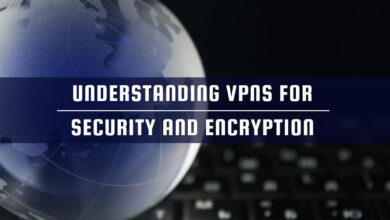VPN Providers And Services
In today’s digital age, where online privacy and security are paramount, VPN (Virtual Private Network) providers and services play a crucial role. These services offer a secure and encrypted connection over the internet, safeguarding your personal information from hackers and snoopers. Reflecting their growing importance, a significant portion of internet users are turning to VPNs for enhanced online security. In fact, 33% of all internet users utilize a VPN, and the industry itself is on a rapid growth trajectory, projected to reach $107.06 billion by 2027 [1].
Whether you’re concerned about protecting your online activities, accessing geo-restricted content, or ensuring secure communication, understanding the various VPN providers and the services they offer is essential. In this section, we will explore the diverse range of VPN services available, their features and benefits, and how to choose the right provider to meet your specific online security needs.
“The VPN industry offers robust encryption protocols like OpenVPN, IKEv2/IPSec, and WireGuard, which are critical for protecting user data.”
Evaluating VPN Service Providers
Here we delve into the critical process of assessing various VPN services, focusing on their security, performance, and user compatibility for informed choices.
Reputation and Track Record
When selecting a VPN service, it’s crucial to assess the provider’s industry reputation and reliability. This involves examining user reviews, online forums, and expert opinions to ensure the provider is known for delivering secure and dependable services.
Server Network Coverage and Locations
A VPN provider’s server network coverage and locations are key. Opt for providers with extensive global server networks, which are vital for accessing geo-restricted content and maintaining connectivity while traveling.
Strong Encryption Protocols
Security is a top priority in VPN services. Look for providers offering robust encryption protocols like OpenVPN, IKEv2/IPSec, and WireGuard, which are critical for safeguarding user data against cyber threats.
In addition to these factors, consider customer support, user-friendliness, device compatibility, and competitive pricing when choosing a VPN provider. This comprehensive approach ensures a secure, reliable, and user-friendly VPN experience.
“33% of internet users use VPNs.”
Comparison of Top VPN Services
Pricing Plans and Subscription Options
When choosing a VPN, it’s important to compare pricing and subscription models. Providers vary in their offerings, with some presenting monthly plans and others offering discounts for longer commitments. Assess the value of each plan, considering any extra features like access to special servers or multiple device connections.
Speed and Performance Analysis
Speed and reliability are crucial for a good VPN experience. Investigate independent speed tests and user reviews to gauge the performance of various services. Providers with extensive server networks usually deliver faster, more stable connections.
Compatibility with Multiple Devices and Operating Systems
Ensure the VPN service is compatible with your devices and operating systems, whether it’s Windows, macOS, iOS, Android, or routers. Look for providers offering dedicated apps for seamless setup and use across different platforms.
Limitations and Potential Risks of Free VPN Services
Free VPNs, while cost-effective, often have limitations like fewer server options, leading to slower speeds and restricted access. Interestingly, it’s worth noting that 27% of VPN providers have servers on all continents, enhancing global accessibility for users [2].
However, despite this broad server availability, free VPNs may still compromise user privacy by selling data to third parties and often include ads and tracking, negating the privacy benefits of a VPN. Moreover, while all VPN providers reviewed offer a no-logs policy, the reliability and enforcement of these policies can vary, especially among free services.
Features and Benefits of Paid VPN Services
Paid VPNs provide extensive server networks for faster, unrestricted access and prioritize privacy with strong encryption and no-logs policies. They offer additional features like ad-blocking, malware protection, and dedicated customer support, enhancing security and user experience.
Privacy and Data Protection Comparison
Free VPNs may offer basic encryption but often fall short in privacy due to financial constraints. In contrast, paid VPNs invest in advanced security measures, adhere to strict no-logs policies, and use the latest encryption standards, ensuring superior data protection.
Understanding VPN Service Policies
Familiarize yourself with logging policies
When choosing a VPN service provider, it is important to understand their logging policies. Logging refers to the collection and storage of user data by the VPN provider. Some providers keep logs of your online activities, while others have a strict no-logs policy. By familiarizing yourself with these policies, you can make an informed decision about which VPN service aligns with your privacy needs.
Consider the jurisdiction of the VPN service
The jurisdiction under which a VPN service operates can have implications for your privacy. Different countries have different laws regarding data retention and surveillance. It is essential to research and understand the jurisdiction in which a VPN provider operates. For example, if a VPN service is based in a country with strong privacy laws, it may offer better protection for your personal information.
Read through the terms of service and privacy policies
To ensure that a VPN service meets your specific needs, it is crucial to read through their terms of service and privacy policies carefully. These documents outline how the provider handles user data, what information they collect, how they use it, and who they share it with.
“Different countries have different laws regarding data retention and surveillance.”
Customer Support and VPN Services
Responsive Customer Support
One of the key factors to consider is the level of customer support offered. Users should look for VPN providers that offer responsive customer support through various channels. This ensures that users can get assistance whenever they encounter any issues or have questions about their VPN service.
User-Friendly Interfaces and Setup Processes
Another important aspect to evaluate when selecting a VPN service is the user-friendliness of its interface and setup process. Users, particularly the 39% of the Gen Z demographic who are active VPN users [3], should opt for services that provide intuitive interfaces. This ease of use is crucial, considering the average cost for a VPN is around $6.50 per month [3]. An intuitive interface and straightforward setup process are particularly appealing at this price point, ensuring that users of all tech-savviness levels can quickly start using the VPN without any hassle.
Additional Features for Support
In addition to responsive customer support and user-friendly interfaces, users should also consider the availability of additional features that enhance the overall support provided by VPN providers. Some examples include live chat support, troubleshooting guides, or comprehensive knowledge bases. These resources can be invaluable in helping users troubleshoot common issues or find answers to frequently asked questions.
VPN Service Reviews and User Feedback
Reading Reviews from Reputable Sources
When selecting a VPN, it’s beneficial to consult reviews from reputable tech publications and independent review sites. These sources provide unbiased insights into various VPN services, covering features, performance, and user satisfaction.
User Feedback on Connection Stability and Speed
User experiences, shared in online forums and customer reviews, are crucial for understanding a VPN’s reliability. Feedback on connection stability, speed, and overall satisfaction offers a real-world perspective on the service’s performance.
Independent Testing Results for Performance Assessment
Independent testing results are key for evaluating VPN performance and reliability. These tests, conducted by neutral organizations, assess factors like speed, security protocols, and server availability, providing a comprehensive view of a VPN’s capabilities.
Frequently Asked Questions
1. What factors should I consider when evaluating VPN service providers?
When evaluating VPN service providers, consider factors such as the provider’s reputation, security features, speed and performance, server network coverage, compatibility with different devices and platforms, privacy policy, customer support quality, and pricing plans.
2. What are the top VPN services available for comparison?
Some of the top VPN services available for comparison include ExpressVPN, NordVPN, CyberGhost VPN, Surfshark, Private Internet Access (PIA), and IPVanish. These services offer a range of features, such as strong encryption protocols, large server networks, and user-friendly interfaces.
3. What are the differences between free and paid VPN services?
Free VPN services often have limitations in terms of data usage or server locations. They may also display ads or collect user data for advertising purposes. Paid VPN services typically offer more extensive features like unlimited bandwidth and access to a larger number of servers while prioritizing user privacy.
Conclusion
In conclusion, understanding VPN services is crucial for online privacy and security. By evaluating factors like security, server networks, speed, and pricing, users can choose the right VPN for their needs. Staying informed about VPN advancements and maintaining updated software are key steps for enhancing online safety and combating cyber threats. This knowledge empowers users to select a VPN provider that best meets their requirements.
Learn more about VPNs for different platforms from our blogs at Security Forward today.

